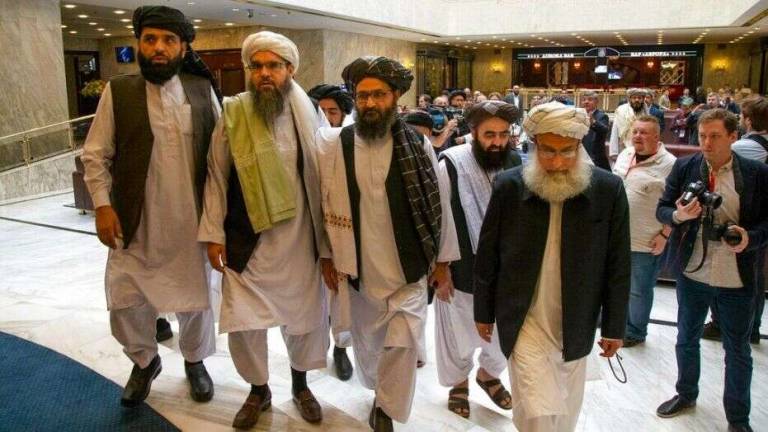As the ragtag Taliban representatives hurry to resume peace talks—this time in Beijing— Afghans look divided over the intra-Afghan dialogue, with some expressing deep concerns over concessions the Taliban insurgents are trying to earn and others feel optimist about the outcome of the talks. Afghans who have been bitten by the Taliban insurgents are convinced that an unconditional peace agreement with the group cannot bring sustainable peace to the conflict-ridden Afghanistan while others say the country will enjoy peace once the Taliban fighters agree to put aside their guns and reintegrate into a normal life.
A Taliban spokesperson Suhil Shaheen said in a tweet earlier this morning, Wednesday, October 23, that a Taliban delegation will attend Beijing conference on Chinese invitation to resume intra-Afghan dialogue. Shaheen said all Afghans will attend the conference on their personal capacity—pointing out that the group will not talk to Kabul-led delegation.
A fresh round of talks is going to be held in Beijing, China, on October 29 and 30. According to a Turkish news agency, Deng Xijun, Chines Special Representative for Afghanistan, met with Mullah Abdul Ghani Baradar, the deputy head of the Taliban and chief of Taliban’s Qatar office, in Doha, Qatar’s capital, late Tuesday.
China has also invited the Afghan government and prominent Afghan politicians to join the table. The Afghan government has confirmed that a group of Afghans will attend the talks.
Regional dimension of Afghan peace talks
After the US President Donald Trump called off the US-Taliban peace talks, the Taliban delegation took up to revisit Moscow, Beijing and Islamabad to discuss peace issues. Russian, Chines and Pakistani diplomats hugged the Taliban representatives in their capitals, unequivocally pressing for a political settlement to end the 18-year-long Afghan war. While Moscow, Beijing and Islamabad see peace talks with the Taliban as the only way to end war in Afghanistan, New Delhi has warily expressed concern over Afghan peace talks, saying a Pakistani leverage weights on the process to tilt the course to a direction that gives an apprehend to the Taliban, the Pakistan’s docile ally in Afghanistan.
The Taliban delegation, though stressed on peace settlement, have refused to sit face-to-face with the Kabul government—labeling it a ‘puppet administration’. The Afghan government-led by the incumbent president Mohammad Ashraf Ghani repeatedly stressed on a political settlement with the Taliban but it has intractably adhered to a peace process led and owned by the Afghans, stressing that only an inclusive Afghan-led peace talks can help the country get rid of the bloodshed and conflict.
On official level, Iran, Saudi Arabia and the Gulf States have been supportive of Afghan peace talks while each have had its own political preferences.
Will Beijing conference bridge gaps?
The question whether Beijing conference can bridge gaps existing over peace issue still remains a puzzle. Although Russia, China, Pakistan, and Qatar look on the same page on Afghan peace talks, India along with the Afghan government have hitherto felt being marginalized.
On Wednesday, October 23, the US Department of State issued statement on Afghan peace process, welcoming “all international efforts that support Afghan peace process.” The announcement read, “Any future intra-Afghan dialogues and peace conferences should build on the achievements of the intra-Afghan Peace Conference in Doha, be inclusive and respect the dignity of all Afghans.” The US Department of State has called on the Afghan government leaders, Ashraf Ghani and Abdullah Abdullah, and other prominent Afghan leaders to prepare the country for intra-Afghan negotiations with the Taliban.
The US-Taliban talks collapsed on September 08, when Mr. Trump abruptly called off peace talks with the Taliban after a Taliban-claimed car bomb killed a US solider and 13 Afghans in eastern part of the capital Kabul.
Trump, who faces election at home, continued to say that he will pull out 14,000 American soldiers who are still stationed in Afghanistan. Mark Esper, the US Defense Secretary, who visited Afghanistan last week, told reporters the US could reduce its force in Afghanistan to 8,600 without hurting the counter-terrorism fight against al-Qaida and the Islamic State group.
Almost all regional countries including Russia, China, Pakistan and Iran are counting down to see US forces go home. But many Afghans believe that the consequence of a rushed US forces withdrawal from Afghanistan will undermine the Kabul government, strengthen the Taliban militants and push the country into abyss of anarchy.




